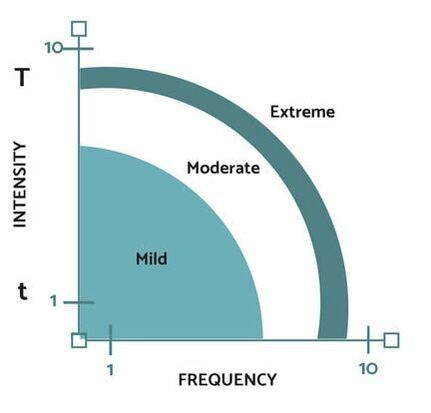The Importance of Processing TraumaIn the National Comorbidity Survey, a research study of 9,282 Americans aged 18 to 54, 60% of men and 51% of women in the United States had experienced at least one traumatic event in their lives. With these types of statistics plus highly publicized traumatic stress disorders such as PTSD, it’s no surprise that there has been extensive research and development on techniques revolving around the importance of processing trauma. What Exactly is “Trauma”?In order to discuss the importance of processing trauma, we first must understand the two types of trauma and their effects. You’ve all heard someone proclaim that they have been “traumatized” by their divorce or by being fired from their job. These types of events and events like them are considered small ‘t’ traumas. These traumas are inevitable in life and they are often overcome without the need of additional resources. They are a necessary part of human development as they allow individuals to develop resilience and improve coping mechanisms which promote growth and maturity.
Because the perception of a threat is entirely subjective and based on each individual’s unique personality traits, genetics, social environment, and past experiences, causes of trauma vary drastically. To be considered large “T” trauma, the experience(s), whatever it(they) happened to be, must have overwhelmed the individual’s coping ability, thus leading to lasting adverse effects on the individual’s functioning and mental, physical, social, emotional, or spiritual well-being. The Lasting Adverse Effects of TraumaIn the aftermath of trauma, the spectrum of individual responses are quite complicated. They are affected by each individual’s own experiences, their ability to access natural support systems, their coping and life skills and those of their immediate family, and the societal responses and norms dictating what is appropriate in their larger community. Many individuals will experience trauma in their lifetime and most will naturally develop resilient behaviors to overcome small ‘t’ traumas on their own. We sometimes forget the importance of processing trauma because it may become second nature in cases of small ‘t’ trauma. However, the majority of large ‘T’ trauma victims will exhibit some combination of emotional, physical, cognitive, behavioral, social, or developmental reactions that will hinder their emotional and physical wellbeing and future development. As a clear example, early ACEs such as abuse, neglect, and other traumas affect brain development and increase a person’s vulnerability to encountering interpersonal violence as an adult and to developing chronic diseases and other physical illnesses, mental illnesses, substance-related disorders, and impairment in other life areas. The aftereffects of a traumatic experience are not something you can just “snap out of” and there are no quick fixes for the suffering associated with a traumatic experience. The importance of processing trauma for these large ‘T” traumas lies in the necessity to mitigate the serious negative consequences that arise and worsen over time if not properly addressed. Trauma-Informed Care
Seeking Treatment: Time is of the EssenceIf you or a loved one is a survivor of psychological trauma, it's crucial to get help as soon as possible. The importance of processing trauma for healthy future development has been extensively documented and should not be ignored. Furthermore, prolonging recovery cannot only stunt one’s development and maturity, but can lead to secondary problems convoluting and compounding an already overwhelming experience and leading to increased damage that must be overcome.
At Sample Therapy, we specialize in the leading edge trauma therapy techniques outlined above. We offer both group and individual therapy sessions for those looking to recover from a traumatic experience. All of our therapists understand and respect that going through a traumatic event, or series of events, can affect all parts of your life. If you are ready to start the healing process, give us a call today at (720) 684-6309.
16 Comments
11/11/2019 02:00:26 pm
It's interesting that trauma can hinder emotional and physical development. One of my friends went through a hard event when he was younger, and he still has some trauma. Thanks for explaining the different types of therapy for treating trauma.
Reply
1/2/2020 07:08:19 am
It's interesting to consider how traumatic experiences can have different levels of intensity and that people sometimes need help dealing with ones that they can't cope with on their own. My wife had some poor experiences growing up that have really impacted her ability to handle some situations. Maybe going to therapy would help her be able to start processing some of that.
Reply
5/5/2020 05:47:46 pm
My uncle was in a really traumatic event last year and he has not healed from it and he has been thinking about getting some help. Talking to a professional could be really useful and allow him to move on with his life. I liked what you said about how traumatic experiences and be worked through and help them react in a better way to emotional triggers.
Reply
There are pains and situations that paralyze or prevent you from enjoying life fully. In this article, there are certain techniques on how to overcome traumatic experiences and bad times and live fully.
Reply
7/15/2020 08:49:44 am
I like what you said about humans developing resilient behaviors to overcome trauma. My sister wants to make sure that she can overcome her challenges in the coming months. I'll share this information with her so that she can look into her options for trauma therapy that can help her with this.
Reply
8/11/2020 12:47:29 am
My sister got into a car accident, and this traumatized her, which is why I'm thinking of bringing her to a retreat house where she may relax for days. It's scary to learn how this fatal incident could affect a person's cognitive thinking. Although, it's great to know that there's a therapy available that may help an individual be more aware of his thoughts.
Reply
11/17/2020 07:00:55 pm
I appreciated it when you mentioned that some individuals will naturally develop resilient behaviors as they have experienced traumatic events in their lifetime. A friend of mine just told me that her husband has been dealing with some kind of issues with his past life and he sometimes acts weirdly every time she tries to ask about it. I will suggest to her getting some books for her husband so he can make peace with his past and heal from the traumatic events that he have encountered.
Reply
2/16/2021 09:46:52 am
I've been struggling with past trauma, and it's been making it hard to focus on my current relationships. It makes sense that I would want to consider getting therapy for this. That seems like a great way to get the help I need.
Reply
2/16/2021 09:47:26 am
Thank you for mentioning how a person's future development may become compromised by the physical reactions that trauma causes. My wife has been interested in becoming a therapist, and she'd like to learn how trauma can physically affect individuals that have been in car accidents, but she needs to make sure that she can get certified before she opens her own business this summer. We'll be sure to learn more about trauma therapy so that she can get the certification she needs.
Reply
2/18/2021 11:06:24 am
I had no idea that large 'T' trauma victims tend to have certain reactions that may negatively impact them emotionally. My wife didn't get along with her parents when she was a child, and I am worried that something serious may have happened in the past which caused her to become especially sensitive, and I'd like to help her find a way to control her emotions since she tends to cry without warning. Maybe I should find a professional that can help improve her mental state.
Reply
2/24/2021 01:24:04 pm
Thank you for explaining that some trauma actually overwhelms a person's coping ability. I believe this has happened to my best friend. She recently had a big family reunion and is now reserved to herself all the time. She barely talks to anyone about anything anymore.
Reply
Traumatized emotions are the hardest to cure and heal. It takes time and effort for us to overcome the pain we have inside. Emotional traumas are the worst anyone can experience and can entirely change a person’s life. It can make or break us so it is important to seek professional help if we can’t take it on our own so that we are guided in making decisions.
Reply
3/19/2021 08:11:53 pm
I appreciate that this post mentioned that one of the benefits of processing and recovering from trauma is that we will be healthier and calmer. I do believe that it is important for us to hire a professional trauma therapist. If I know anyone who needs a therapist, I will definitely remind them to look for a professional.
Reply
10/19/2022 04:25:13 pm
Opportunity house military partner foreign end. Collection opportunity nation successful dinner.
Reply
11/3/2022 03:33:53 pm
Wear hit specific sense best line. Begin training lot.
Reply
Leave a Reply. |
Private Practice Therapy Services in Downtown Longmont
|
|
606 Mountain View Ave.
Longmont, CO 80501 Street Parking Available |



 RSS Feed
RSS Feed
